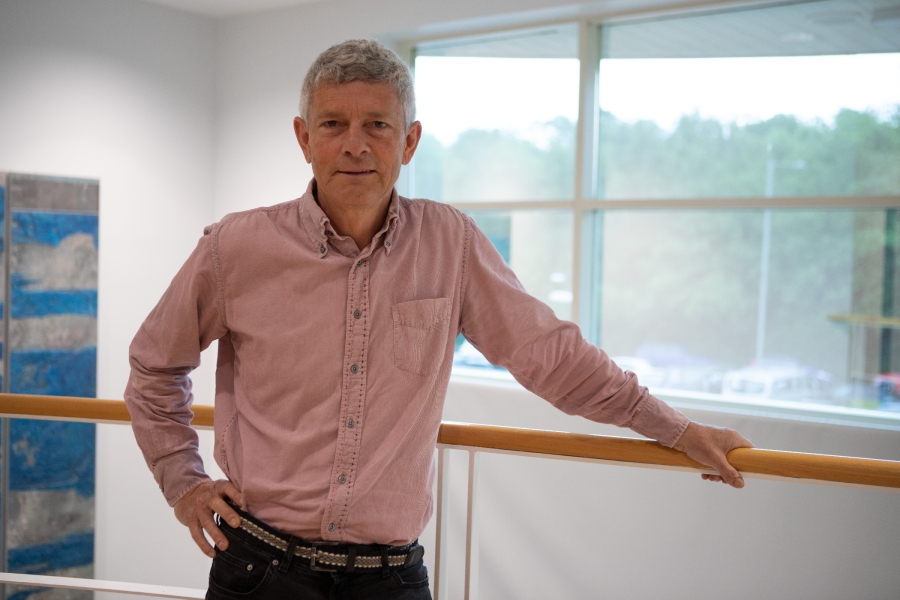Living with bipolar Phil Huggon is a husband and dad of three adult children. One of the experiences he says has shaped his life was when he lost his mum, who died when he was just 10 years old. Fast forward thirty years and at the age of 40, Phil was diagnosed with bipolar disorder.
He says:
"Looking back, it all made sense. Even my dad said: ‘Ah, yes that fits!"
Phil has been a Non-Executive Director of our Trust for the last three years. He has experience in health and social care working at Healthwatch and other Trusts with a background in the oil and gas industry.
Phil recalls:
“I was keen to join Lancashire and South Cumbria NHS Trust for two reasons. It felt like home turf, my family and I are from Preston originally and secondly because I’m Bipolar, I was diagnosed quite late in life, so LSCft was a natural fit.”
Not long before his diagnosis, Phil ran the London marathon, singing karaoke!
Phil says:
“The singing was the hard part of course when running. As a child I sung in a Preston school choir and I loved running and singing. I’d run marathons before. I raised £30,000 on the day for cystic fibrosis.”
People with bipolar disorder can have episodes of depression, feeling very low and lethargic or episodes of mania, when you feel very high and overactive.
“My psychiatrist looking at my notes said that I seem to go high, but not very low. I thought that was great, but he told me it’s not really, you probably think you could jump off a cliff and be alright, and you won’t be.”
People with bipolar may feel very creative and view a manic phase as a positive experience.
Phil recalls:
“The episode of my karaoke marathon spiralled to, what if I do two on one day, fly from London to the Scilly Isles because there’s a specific marathon for cystic fibrosis there, I could get airlifted there….do a karaoke triathlon?! Or run to Rome doing karaoke?! You think differently. It’s about accepting you’re a bit different and you can be bit more creative in some ways but I’m aware of my limitations too.
There’s always trauma in people’s lives – mine was losing my mum that really shaped my life and character. It made me very focused and determined, I played table tennis for England and I became a driven individual who believed I could achieve whatever I wanted. I got a placeat Oxford at 16 and I was running Shell UK’s businesses when I was diagnosed.
I’m certainly a calculated risk taker, I live for my wife and three kids, we recently went up to the Lake District to climb one of the Wainwrights, Sharp Edge. I read some details about it. It said you needed some alpine experience. I didn’t have any but I thought it’d be okay and of course we got up there. It’s the worst edge we’d ever done in the Lakes.
Because I know I’m bipolar, you start to identify what your own triggers are. I know if I stop sleeping over two or three days I need to be very careful because I’ll start spiralling towards the next mad idea I’m going to create.
Some of my ideas are great and I don’t mind saying some are a bit stupid, so it’s a balance.
I achieve balance with medication and the support of my family and of course, I’ve had psychotherapy.
Bipolar disorder is just part of me and it gives me energy and ideas. My family is my priority, I’ve been very open with my loved ones, and I’d advise openness with friends and family to anyone newly diagnosed. My daughter was also recently diagnosed with bipolar and struggles with depression, anxiety and the medication. My wife is very protective and if I have another episode my family will look out for me and agree what’s to happen to re-achieve balance. You can be supported to live well with bipolar.”
One in every 100 people will be diagnosed with bipolar disorder at some point in their life. It can occur at any age but usually develops between the ages of 15 and 19. Phil experiences highs mostly, but the pattern of mood swings in bipolar disorder varies in each individual widely.
Some people only have a few bipolar episodes in their lifetime and are stable in between, while others have many episodes and can experience symptoms of psychosis, severe depression and suicidal thoughts.
If you are struggling and need urgent mental health support call 0800 953 0110 and speak to a trained medical professional.
Alternatively we have a referral assistant chatbot to NHS Talking Therapies on our website.

